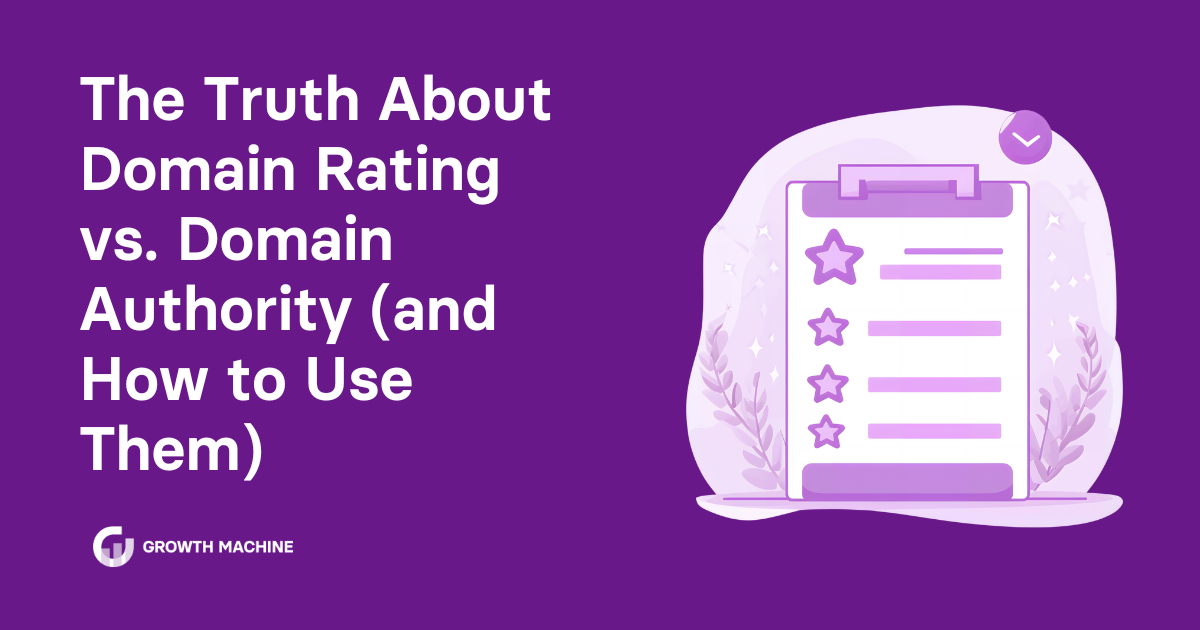The Truth About Domain Rating vs. Domain Authority (and How to Use Them)
Search engine optimization (SEO) is a must if you want to bring more organic traffic to your website. But there’s so much jargon in this space! If you’re trying to DIY SEO for your small business, sometimes it feels like you need to be an SEO expert just to untangle the confusing terms.
Fortunately, you don’t need to be an SEO pro to boost your site’s ranking on search engine results pages (SERPs). You just need the right SEO tools in your corner, plus an understanding of what these tools are measuring and how the metrics should affect your SEO strategies.
If you use Moz or Ahrefs, you’ll recognize the terms Domain Rating and Domain Authority. Both metrics look at the strength of your website’s backlink profile, but they calculate these scores differently.
So, which metric should you prioritize?
In this guide, we’ll break down the differences between DA and DR, how to calculate them, their use cases, and their limitations. Plus, we’ll share actionable tips on how to improve your website authority, earn high-quality backlinks, and create a winning SEO strategy that goes beyond just these numbers.
What Is Domain Rating (DR)?
If you have an Ahrefs subscription, you’ll see your Domain Rating featured prominently in your dashboard. Ahrefs invented DR to help its users understand their website performance. While its rival, Moz, looks at several factors to calculate DA, Ahrefs keeps things simple by only looking at the quality and quantity of backlinks.
Ahrefs calculates your DR score by:
- Counting the number of unique domains linking to your web pages
- Calculating the quality of the backlinks
- Assigning scores on a logarithmic scale from 0 to 100, meaning it’s much harder to go from 80 to 90 than from 10 to 20
DR only looks at link popularity to score your website. If you’ve put your backlink strategy on the back burner, you’ll likely have a lower DR. The good news is that backlinks change all the time, so reinvesting in a backlink outreach can steadily improve your DR over time.
What Is Domain Authority (DA)?
Like Ahrefs, Moz developed Domain Authority to help its users better understand their website’s potential to rank well in Google search. The big difference, though, is that Moz doesn’t just look at backlinks—it looks at several factors, including:
- The number of linking root domains (like Ahrefs)
- The quality of backlinks (also like Ahrefs)
- Your overall link profile, including both no-follow and do-follow links
- Domain age, since older domains usually have more credibility and stronger website authority
- Your internal linking strategy
Like Domain Rating, Moz also scales Domain Authority from a scale of zero to 100. Since it monitors more factors, you can expect your DA score to change more over time than your DR score. The good news is that you have more control here—you aren’t focusing solely on convincing other websites to link to yours. In fact, you can get a higher DA score by improving internal links or hanging onto your domain.
Domain Rating vs. Domain Authority
Search engines don’t calculate your domain rating or domain authority. Since Google keeps a tight lip on how, exactly, certain websites rank, DR and DA are helpful proxies for understanding what search engines see when they crawl and rank your site. Still, it’s important to note that Google isn’t checking these metrics—they’re just a helpful tool for tracking SEO progress over time.
While Domain Rating might sound similar to Domain Authority, it’s not quite an apples-to-apples comparison. Let’s look at the main differences between domain rating vs. domain authority.
Calculation
DR and DA aren’t the same because they calculate different factors. Your DA score considers multiple ranking factors, including internal linking and domain age, while your DR score focuses exclusively on link popularity and the quality of backlinks. These differences aren’t a bad thing; it just means you need to pick the metric that best fits your SEO goals.
Use Cases
There’s no clear winner in the tug-of-war between Domain Rating vs. Domain Authority. Both are helpful for assessing your link building strategies, analyzing competitors, and evaluating the overall strength of a website.
Tracking both can be helpful, but if you’re strapped for time, it’s best to focus on one. For example, if backlinks are your number-one priority, go with Domain Rating. DR is better for honing in on assessing link popularity, and especially on the impact of high-quality backlinks on your site’s ranking potential.
But if you’re improving SEO in multiple areas, like backlinks and internal linking, Domain Authority might be more helpful. DA is usually better for measuring website authority in a broader sense, especially if you care about monitoring multiple known Google ranking factors.
Limitations
Remember, your DA score and DR score aren’t official. Google uses complex ranking algorithms, including machine learning, PageRank, and other technical SEO components to rank your site—and it isn’t divulging its secrets any time soon.
Tracking domain rating and domain authority can be helpful, but this approach has a few limitations:
- A high score doesn’t always translate to better search engine rankings.
- Not all backlinks are “good” backlinks. Both metrics weigh inbound links differently, but neither can fully account for low-quality or spammy backlinks.
- While Domain Authority measures more factors, neither DA nor DR tells the whole story. For example, they don’t look at factors like on-page content, user experience, or website traffic, which affect your website’s actual SEO performance.
So, while DR and DA have their time and place, they aren’t the be-all, end-all of SEO. Always check your other metrics, keyword rankings, and analytics to get a better idea of how you’re really doing. Don’t take a single metric too seriously—let multiple factors tell you what’s really going on.
Using DR and DA Effectively for SEO
You should take your DR and DA scores with a grain of salt, but that isn’t to say they don’t have value for SEO. Follow these quick tips to turn these SEO scores into tangible progress:
- Prioritize high-quality backlinks: Sure, link quantity matters, but both Moz and Ahrefs (and Google, for that matter) care more about the quality of a link. Instead of submitting to low-quality link farms, take the time to create a solid backlink strategy that earns you links from top-quality sites.
- Monitor your competitors’ scores: You don’t just have access to your Domain Rating and Domain Authority stores. You can also see how your competition ranks! Look for competitors with higher scores and study their link profiles to see where they’re earning backlinks. Research what types of high-quality content they post. While you shouldn’t copy them exactly, you can follow their approach to differentiate your content from what’s already out there.
- Combine DR and DA with other metrics: DA or DR alone can be misleading. Integrate them with SEO metrics like organic traffic, keyword rankings, and page authority (PA) to better understand your potential to rank. Improving your site speed and mobile friendliness is also great for both the user experience and search engine rankings.
- Create quality content: A strong SEO strategy isn’t just about backlinks—it’s about creating high-quality content that naturally attracts links and builds website authority over time. Long-form, SEO-optimized articles tend to earn coveted do-follow links, which share link juice across websites. If you don’t have one already, create a content marketing strategy to steadily boost your spot in the SERPs.
Maximize SEO performance Beyond DA and DR
Both Domain Authority and Domain Rating are helpful indicators of your website’s ranking potential, but they’re guides, not guarantees. By combining high-quality backlinks, smart SEO strategies, internal linking, and strong content marketing, you can improve your site authority and drive organic traffic—regardless of what your DA or DR score says.
A higher DA or DR score is helpful, but focusing on website ranking, organic traffic, and overall SEO strategy is what drives long-term success. Skip to the front of the line by partnering with Growth Machine. Our expert SEO and content marketing team simplifies the jargon to get measurable results for your website. Contact Growth Machine today to boost your website’s reputation.







